Pakistan emerged due to the fatal flaws of majoritarian democracy in the Indian subcontinent. There were many social divisions in the Indian subcontinent based on identity during the British Raj in India. There were hard barriers based on caste and apparently soft barriers based on religious identity. While democracy created space for people of different identities to participate in the political process, religious and caste identities created barriers to their inclusion in political power. Majoritarian democracy where ‘winner takes all’ can keep minority groups disenfranchised in multi-identity politics. Mohammad Ali Jinnah and Ambedkar clearly saw the threat posed by this imbalance. However, the crisis of majoritarian democracy continued after the creation of Pakistan as old Hindu and Muslim identities were replaced by new ethnic identities in the Muslim community. Like undivided India, the democratic system in Pakistan did not provide any safeguards for the protection of minorities. The crises of majoritarian democracy was again solved through the separation of East Pakistan and the creation of Bangladesh. At the present moment, our democratic system is not able to resolve the contradictions that it has created because it formally protects but informally discriminates against the weak, vulnerable, and minority groups.
Our democracy suffers from both its majoritarian and authoritarian impulses. The conflict generated by our shallow form of democracy has taken an ugly turn. Our political culture has become toxic, and it is threatening the very foundations of our existence. This conflict is represented by the conflict between Pakistan Tehreek e Insaf (PTI) and Pakistan Democratic Movement (PDM), but it is much deeper than that. Our voters, taxpayers, youth, and urban middle class feel cheated and disenfranchised due to the power game in the name of many but in the interest of few. Unless the power players agree to sit at the table to negotiate on issues that can broaden and deepen our democracy our system of governance will collapse but will reproduce itself under a different leadership. This is the time to change the rules of the game. Calling for early elections is a fair demand, but it will not solve our perpetual political instability caused due to the inherent limitations of our fake democracy.
In specific we need to consider some of the issues in the public square and in the parliament. No single party or power group can legislate new rules of the game. It has to be done together. Some of the issues that need to be considered are ending land grabbing on highly discounted prices and auctioning the state land for sale, imposing at least a 4 percent wealth gain tax, documenting the economy, replacing aid (loans) with investment and trade as an economic regime, regularly holding inner party elections, devolution of administrative, political and fiscal authority to the local government, and proportional representation. Show of street and state power should be done within constitutional limits but the debate should be carried out in the parliament. The ruling PDM alliance should mend fences with PTI and invite them for a dialogue. It is a tall agenda but a journey of a thousand miles begins with the first step.
Fayyaz Baqir
“The most potent weapon in the hands of the oppressor is the mind of the oppressed” – Steve Biko








